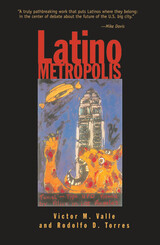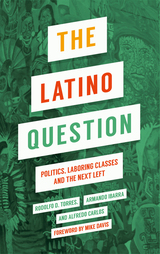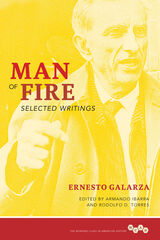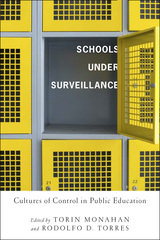4 books by Torres, Rodolfo

Latino Metropolis
Victor M. Valle
University of Minnesota Press, 2000
A readable look at culture and politics in Los Angeles through a Latino lens.
"The authors have taken careful observations and measurements of the political, economic and social factors that affect the Latino population, ranging from the globalization of the Southern California economy to the shrinkage in housing, schools and social services. Caught among these seemingly blind and irresistible forces, however, are human beings, and the authors issue a dire warning that we ignore the poor and disempowered among us at our own peril. Clearly, Latino Metropolis seeks to hold us all to the very highest standards when it comes to understanding and honoring the Latino traditions of California and accommodating the urgent needs of its growing Latino population. And the fact is that its verbal pyrotechnics serve their intended purpose--the authors manage to catch and hold our attention with the occasional verbal blow, and then they deliver a sober (and sobering) lecture on the hard realities of multiculturalism." Los Angeles Times
"Latino Metropolis is a significant work of scholarship on Los Angeles and Latinos that puts the political economy back into academic and public discourse. The authors' detailed descriptions, insightful analysis, and identification of 'strategic opportunities' for change make the book a must read for scholars, community activists, and policy makers concerned with city building and community organizing." New Political Science
Los Angeles: scratch the surface of the city's image as a rich mosaic of multinational cultures and a grittier truth emerges-its huge, shimmering economy was built on the backs of largely Latino immigrants and still depends on them. This book exposes the underside of the development and restructuring that have turned Los Angeles into a global city, and in doing so it reveals the ways in which ideas about ethnicity-Latino identity itself-are implicated and elaborated in the process. A penetrating analysis of the social, economic, cultural, and political consequences of the growth of the Latino working-class populations in Los Angeles, Latino Metropolis is also a nuanced account of the complex links between political economy and the social construction of ethnicity.
Lifting examples from recent news stories, political encounters, and cultural events, the authors demonstrate how narratives about Latinos are used to maintain the status quo-particularly the existing power grid-in the city. In media representations of riots, in the recasting (and "whitening") of Mexican food as Spanish-American cuisine, in the community displacement that occurred as part of the development of the Staples Center-in telling instances large and small, we see how Los Angeles and its Latino population are mutually transforming. And we see how an old Latino politics of "racial" identity is inevitably giving way to a new politics of class.
Combining political and economic insight with trenchant social and cultural analysis, this work offers the clearest statement to date of how ethnicity and class intersect in defining racialized social relations in the contemporary metropolis.
Victor M. Valle is associate professor of ethnic studies at California Polytechnic State University, San Luis Obispo. Rodolfo D. Torres is associate professor of education at the University of California, Irvine, where he teaches social policy and urban political economy.
[more]

The Latino Question
Politics, Laboring Classes and the Next Left
Rodolfo D. Torres
Pluto Press, 2018
In the United States, the number of Latinos struggling in pursuit of the American Dream has never been greater. Millions work towards this ideal each year, only to find themselves trapped in a cycle of debt and labor. The need for a vivid, empirically grounded study on Latino politics, culture, and social issues is more essential now than ever before—The Latino Question fulfills this gap, offering a cutting-edge overview and analysis of the transformative nature of Latino politics in the United States.
In a radical alternative to the dominant orthodoxy in Latino political studies, Rodolfo D. Torres, Armando Ibarra, and Alfredo Carlos emphasize the importance of political economy for understanding Latino politics, culture, and social issues. Written in an accessible style, the authors draw from extensive original research and several critical traditions—including Karl Marx, Antonio Gramsci, and Michel Foucault—to make crucial links between socio-economic and culture-based approaches for understanding the politics of race and ethnicity in capitalist society. Notably, they present front-line evidence of how some Mexican communities across America are not only resisting, but also reinventing and transforming the predominant economic ideas. The Latino Question will be essential for anyone hoping to understand the changes in Latino communities in America today.
In a radical alternative to the dominant orthodoxy in Latino political studies, Rodolfo D. Torres, Armando Ibarra, and Alfredo Carlos emphasize the importance of political economy for understanding Latino politics, culture, and social issues. Written in an accessible style, the authors draw from extensive original research and several critical traditions—including Karl Marx, Antonio Gramsci, and Michel Foucault—to make crucial links between socio-economic and culture-based approaches for understanding the politics of race and ethnicity in capitalist society. Notably, they present front-line evidence of how some Mexican communities across America are not only resisting, but also reinventing and transforming the predominant economic ideas. The Latino Question will be essential for anyone hoping to understand the changes in Latino communities in America today.
[more]

Man of Fire
Selected Writings
Ernesto Galarza, Edited by Armando Ibarra and Rodolfo D. Torres
University of Illinois Press, 2013
Activist, labor scholar, and organizer Ernesto Galarza (1905–1984) was a leading advocate for Mexican Americans and one of the most important Mexican American scholars and activists after World War II. This volume gathers Galarza's key writings, reflecting an intellectual rigor, conceptual clarity, and a constructive concern for the working class in the face of America's growing influence over Mexico's economic system.
Throughout his life, Galarza confronted and analyzed some of the most momentous social transformations of the twentieth century. Inspired by his youthful experience as a farm laborer in Sacramento, he dedicated his life to the struggle for justice for farm workers and urban working-class Latinos and helped build the first multiracial farm workers union, setting the foundation for the emergence of the United Farm Workers Union. He worked to change existing educational philosophies and curricula in schools, and his civil rights legacy includes the founding of the Mexican American Legal Defense Fund (MALDEF) and the National Council of La Raza (NCLR). In 1979, Galarza was the first U.S. Latino to be nominated for the Nobel Prize in Literature, for works such as Strangers in Our Fields, Merchants of Labor, Barrio Boy, and Tragedy at Chualar.
[more]

Schools Under Surveillance
Cultures of Control in Public Education
Monahan, Torin
Rutgers University Press, 2009
Schools under Surveillance gathers together some of the very best researchers studying surveillance and discipline in contemporary public schools. Surveillance is not simply about monitoring or tracking individuals and their dataùit is about the structuring of power relations through human, technical, or hybrid control mechanisms. Essays cover a broad range of topics including police and military recruiters on campus, testing and accountability regimes such as No Child Left Behind, and efforts by students and teachers to circumvent the most egregious forms of surveillance in public education. Each contributor is committed to the continued critique of the disparity and inequality in the use of surveillance to target and sort students along lines of race, class, and gender.
[more]
READERS
Browse our collection.
PUBLISHERS
See BiblioVault's publisher services.
STUDENT SERVICES
Files for college accessibility offices.
UChicago Accessibility Resources
home | accessibility | search | about | contact us
BiblioVault ® 2001 - 2024
The University of Chicago Press









